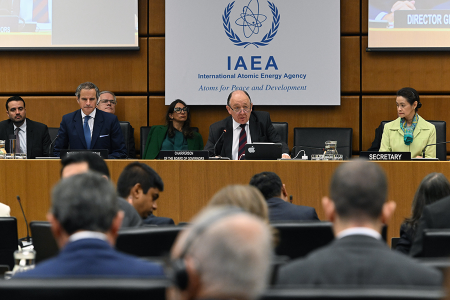“For 50 years, the Arms Control Association has educated citizens around the world to help create broad support for U.S.-led arms control and nonproliferation achievements.”
Reacting to Censure, Iran Expands Enrichment Activities
July/August 2024
By Kelsey Davenport
Iran expanded its uranium-enrichment capacity after the International Atomic Energy Agency (IAEA) Board of Governors passed a resolution censuring Tehran for failing to cooperate with the agency.

The June 5 censure “reaffirms” the board’s decision from November 2022 that it is “essential and urgent” for Iran to clarify “all outstanding safeguards issues,” including providing the agency with “technically credible explanations” for the presence of uranium at two locations in Iran that were not declared to the IAEA. The resolution also calls on Tehran to provide the agency with design information for new nuclear facilities, as required by Iran’s safeguards agreement.
The resolution, which passed by a vote of 20-2, was expected. France, Germany, and the United Kingdom said at the previous board meeting in March that they would put forward a resolution at the June meeting if the IAEA reported no progress on its investigation. (See ACT, April 2024.)
IAEA Director-General Rafael Mariano Grossi traveled to Iran in May, but his trip did not produce any concrete results. Iran delayed further talks with the agency after the deaths of Iranian President Ebrahim Raisi and Foreign Minister Hossein Amirabdollahian in a May 21 helicopter crash. (See ACT, May 2024.)
In a joint statement on June 5, the three European states said that the resolution demonstrates that the board “will not sit idly by” when Iran undermines the safeguards regime and will “hold Iran accountable” for failing to meet its legal obligations.
The statement noted that the IAEA has been investigating the sites in question for five years and that Iran has “not reacted in substance” since the previous resolution was passed 18 months ago. The three states urged Iran to “resolve these outstanding matters so that no further board action is necessary.”
Iran described the resolution as “hasty and unwise.” In a June 5 statement, Mohsen Naziri Asl, Iran’s ambassador to the IAEA, said the resolution would “severely affect” efforts between Tehran and the agency to address outstanding issues. He said the Europeans will “bear responsibility” for Iran’s actions in response to the resolution.
The following week, Iran appeared to walk back Asl’s suggestion that cooperation with the agency would be affected by the resolution. The foreign ministry said on June 14 that Iran will continue “constructive interaction” with the IAEA.
The United States voted for the resolution, but was initially reluctant, according to a June 4 email from a European official to Arms Control Today. The official said that the Biden administration was cautious because Iran was “certain to escalate” its nuclear activities in response.
In a June 5 statement expressing U.S. support for the censure, Laura Holgate, ambassador to the IAEA, said that the resolution must be “tied to a broader strategy.” It should be a “first step” toward “achieving a sustainable, effective solution to Iran’s nuclear program that includes full cooperation with the IAEA,” Holgate said.
The European and U.S. statements referenced the importance of making progress before October 2025 when the option to reimpose UN sanctions on Iran expires. The so-called snapback option allows members of the 2015 nuclear deal, known as the Joint Comprehensive Plan of Action, to reimpose UN sanctions using a process that cannot be vetoed.
Once the option expires, it is highly unlikely that the Security Council would pass new sanctions on Iran for its nuclear activities because Russia likely would veto any new measures.
China and Russia voted against the censure resolution. The two countries joined Belarus, Iran, Syria, Venezuela, and Zimbabwe in a June 5 joint statement criticizing the resolution prior to the vote. The states called the approach “unconstructive and confrontational.” They called on all states to provide the IAEA and Iran “with the necessary time and space to take further constructive efforts.”
Unlike Iran’s reactions to the two previous board resolutions, Tehran did not announce immediately what steps it would take to expand its nuclear program in response to the resolution.
According to an IAEA report on June 13, Iran informed that agency on June 10 of its intention to install an additional 18 cascades of IR-2 centrifuges at the fuel enrichment plant at Natanz and an additional eight cascades of IR-6 centrifuges at the Fordow fuel enrichment plant. The IR-2 and IR-6 centrifuges enrich uranium more efficiently than the IR-1 model, which Iran was limited to using for 10 years under the 2015 nuclear deal.
On June 11, the IAEA verified that Iran had completed the installation of two of the six cascades at Fordow and that installation of the remaining four cascades was underway. The report did not provide any details about whether Iran intends to operate these centrifuges.
Iran had long planned to expand capacity at Fordow, a deeply buried enrichment facility near the city of Qom. In November 2022, Iran announced that it would install an additional eight cascades of IR-1 and IR-6 centrifuges at the facility. Although the IAEA reported that Iran had taken steps to prepare for additional centrifuges, it did not report any newly installed machines until the June 13 report.
U.S. State Department spokesperson Matt Miller said in a June 14 press release that Iran’s nuclear expansion has “no credible peaceful purpose” and that the United States will respond “if Iran implements these plans.”
The Group of Seven industrialized nations also criticized Iran for an expanding uranium-enrichment program with “no credible civilian justifications” and called on Tehran to “cease and reverse nuclear escalations.” The June 14 statement said that Iran should comply with the IAEA board censure resolution and fully cooperate with the agency. It also called on Iran to “stop assisting Russia’s war in Ukraine” and refrain from transferring ballistic missiles to Moscow.
